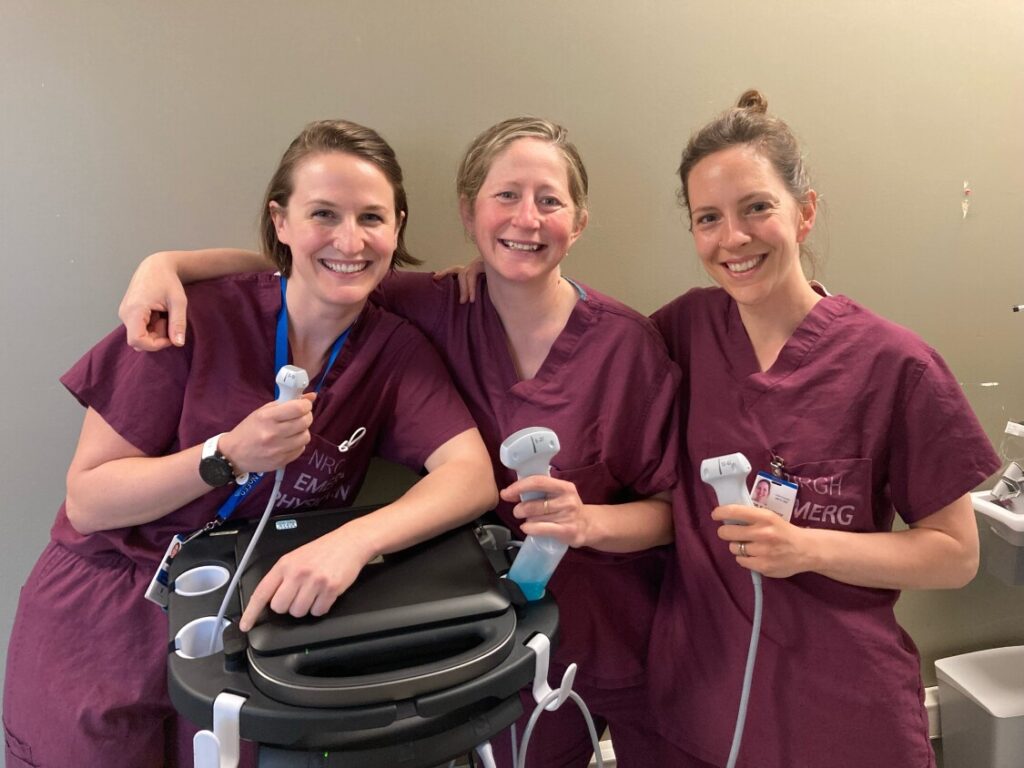“There’s a common saying in medicine that when an emergency happens, you can’t count on rising to the challenge, you have to rely on falling to your level of training, and so I decided I wanted to pursue more training to enhance my ability to work in rural emergency rooms,” recounts Dr. Christie Chan.
Dr. Chan was a new family practice graduate when she arrived to work for the Nisga’a Valley Health Authority. When she first got there, she was struck by the beauty of the community and the diversity of the land, but she was also very conscious of being alone in the clinic and ER.
“I think everybody in their first couple of years, and especially their first year, stresses a lot about being on call, especially when there’s no backup” Dr. Chan said. “There’s no anesthesiologist here. There’s not even necessarily another doctor for you to call in.”
It was a desire to feel better prepared, particularly for airway procedures, that spurred Dr. Chan to access additional training through the Emergency Education Program (*EEP), a rural health project that, since 2017, has been quietly building rural health resources and capacity across the province. The program originated in Nanaimo (NEEP) and expanded to Prince George (NoEEP) and Kamloops (KEEP). Dr. Chan was accepted into a NoEEP cohort, enabling her to enhance her confidence and establish a network of mentors.
“I definitely would recommend it. If you’re feeling like you need more volume or experience, it really helps,” she said, adding: “I think it really gives you ties across the province, and not just clinical support, but also mentorship.”
Now the medical director of the Nisga’a Valley Health Authority, Dr. Chan said she still accesses the resources from the program.
Even though the program was two years ago, my cohort, we still occasionally talk, and we go over cases together, and, once in a while, I’ll even contact my old preceptors and chat about interesting cases or show them a video of a point of care ultrasound.
Dr. Christie Chan

Inception and Purpose
The program’s initiator, Dr. Kevin McMeel, a physician based in Nanaimo, developed NEEP due to perceived gaps in family practice medical training. Having been involved in resident education through UBC for years, Dr. McMeel recognized that many graduates didn’t feel adequately prepared for rural community and emergency department work. As residents completed their two-year residencies, they often felt ill-equipped for rural settings due to insufficient training and experience from their family medicine programs.
Dr. McMeel aimed to establish a practical, hands-on program that immersed family practice physicians in an emergency fellowship with training and academic components. He observed that family physicians covering emergency departments lacked exposure to high-acuity cases during their early on-call duties, leading to diminished confidence. “Our goal is to provide them with a comparable amount of procedural and clinical experience as they would gain in high-volume centers,” he explained. “We also aim to transform them from ultrasound novices to adept and confident users of the technology.”
Expanding Impact
Now operating across three sites—Nanaimo, Prince George, and Kamloops—these programs receive funding from the Rural Coordination Centre of BC and REAP (Rural Education Action Plan) via the Joint Standing Committee on Rural Affairs. The program offers family physicians in smaller rural communities a three-month, full-time, paid fellowship in Emergency Medicine.
Dr. Elizabeth Kruithof, based in Smithers, participated in NEEP (Nanaimo) with two goals: gaining more experience in the emergency department and enhancing her procedural skills so they could be implemented in her home practice and becoming a resource for her colleagues and community.
Following completion of the course, Dr. Kruithof continued to build on the local Simulation program, and also became more interested in Point of Care Ultrasound (PoCUS). Upon returning to Smithers, she leveraged connections made during her participation in NEEP to establish a network of providers in Smithers and neighboring communities, such as Hazelton, who shared her interest in PoCUS. This network enabled them to introduce the Emergency Department Echo (EDE) ultrasound course to Smithers, resulting in multiple providers trained in PoCUS and benefiting the community.
Program Praise and Availability
Dr. Kruithof applauded NEEP and said she recommends it to colleagues. Despite her seven years of experience before NEEP, she found the program relevant, enabling her to focus on community-specific aspects. She said: “Being in a rural place is a funny mixture of not seeing the same volume of serious cases as you would if you were in Vancouver or Nanaimo, where we were training, but when you do get the serious cases, you have no backup. It’s just you.
“I felt like I wanted to do the extra training, just to be able to provide a higher level of service to the patients that I have here, and then also to feel more confident when I was doing that.”
NEEP/NoEEP/KEEP suits physicians with rural practices, those engaged in rural locum work, or those interested in increasing their confidence in rural healthcare. Each cohort accepts nine physicians, three at each site. The programs run twice a year, with cohorts in spring (April-June) and fall (September-December).
Many family physicians who completed the fellowship have successfully taken the emergency medicine exam, becoming certified emergency doctors.
Applications are being accepted for the Fall 2024 Cohorts. For program information or applications, visit neepdocs.ca.